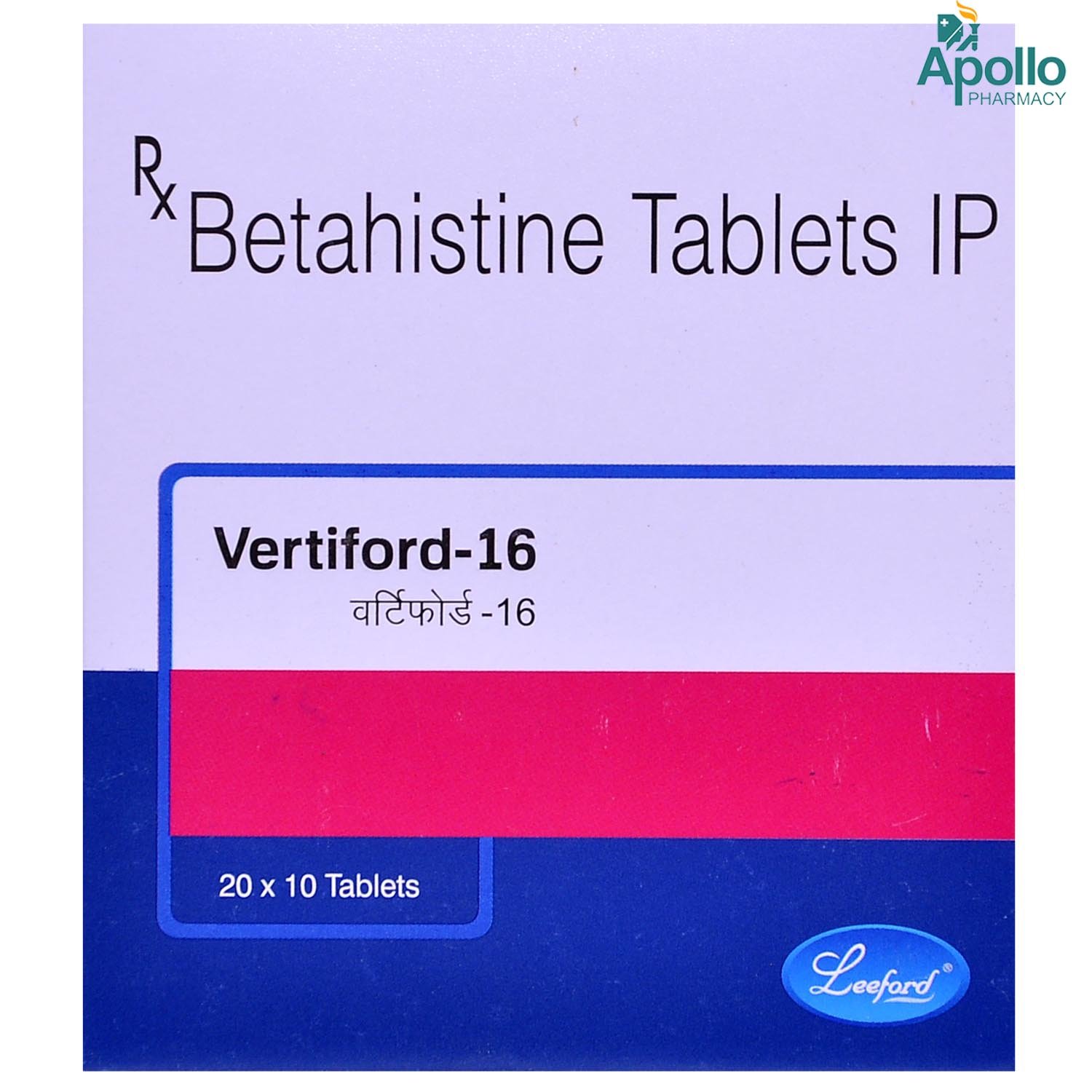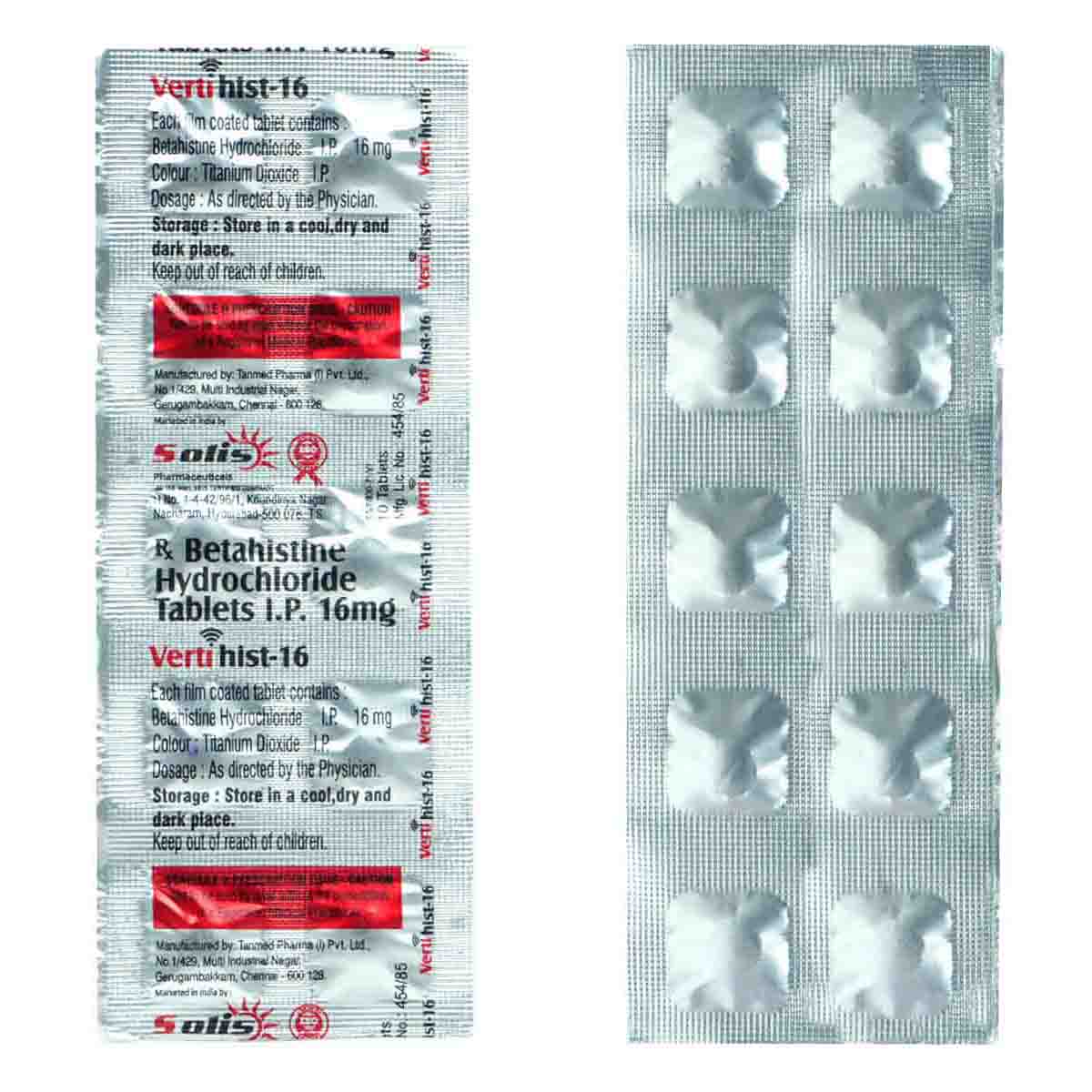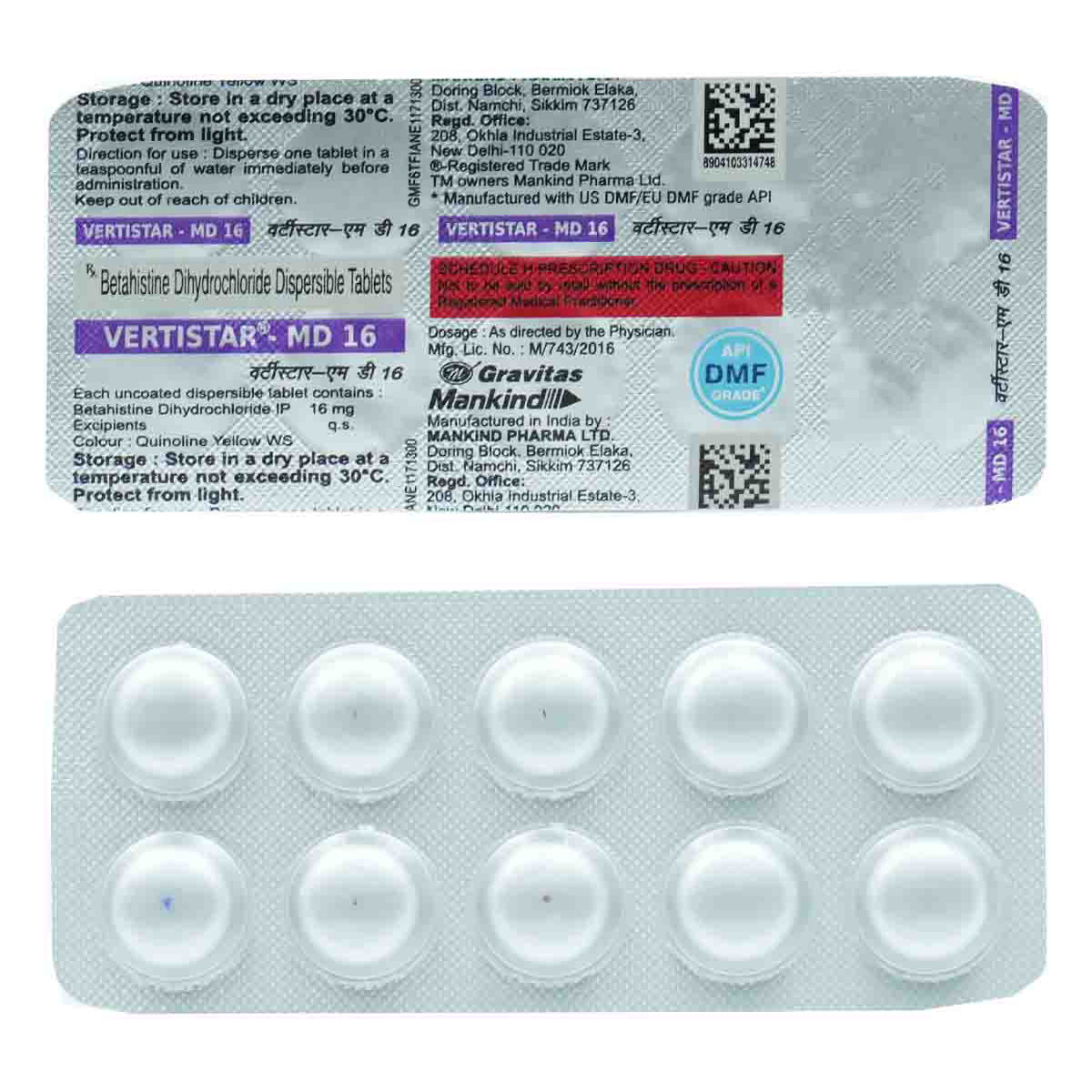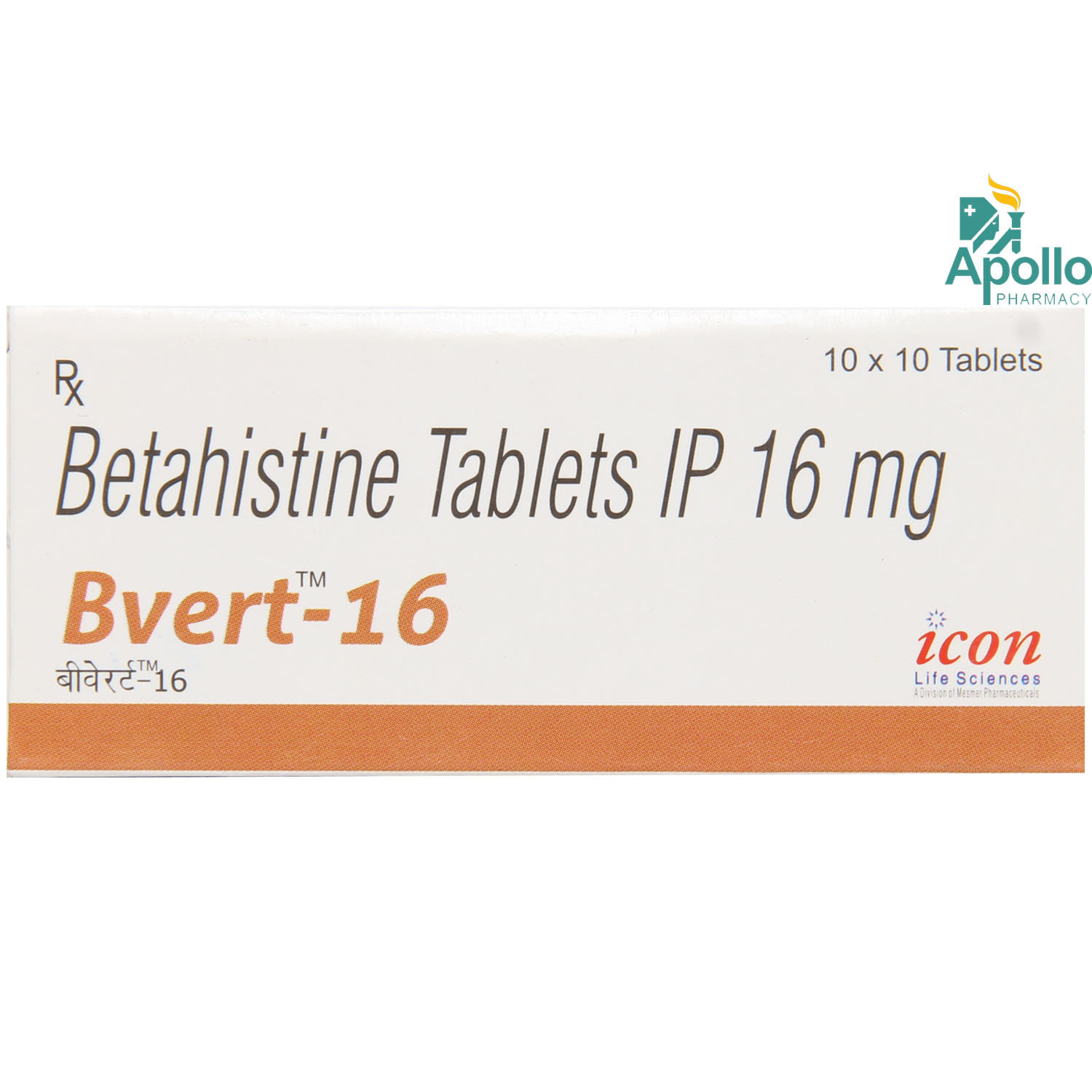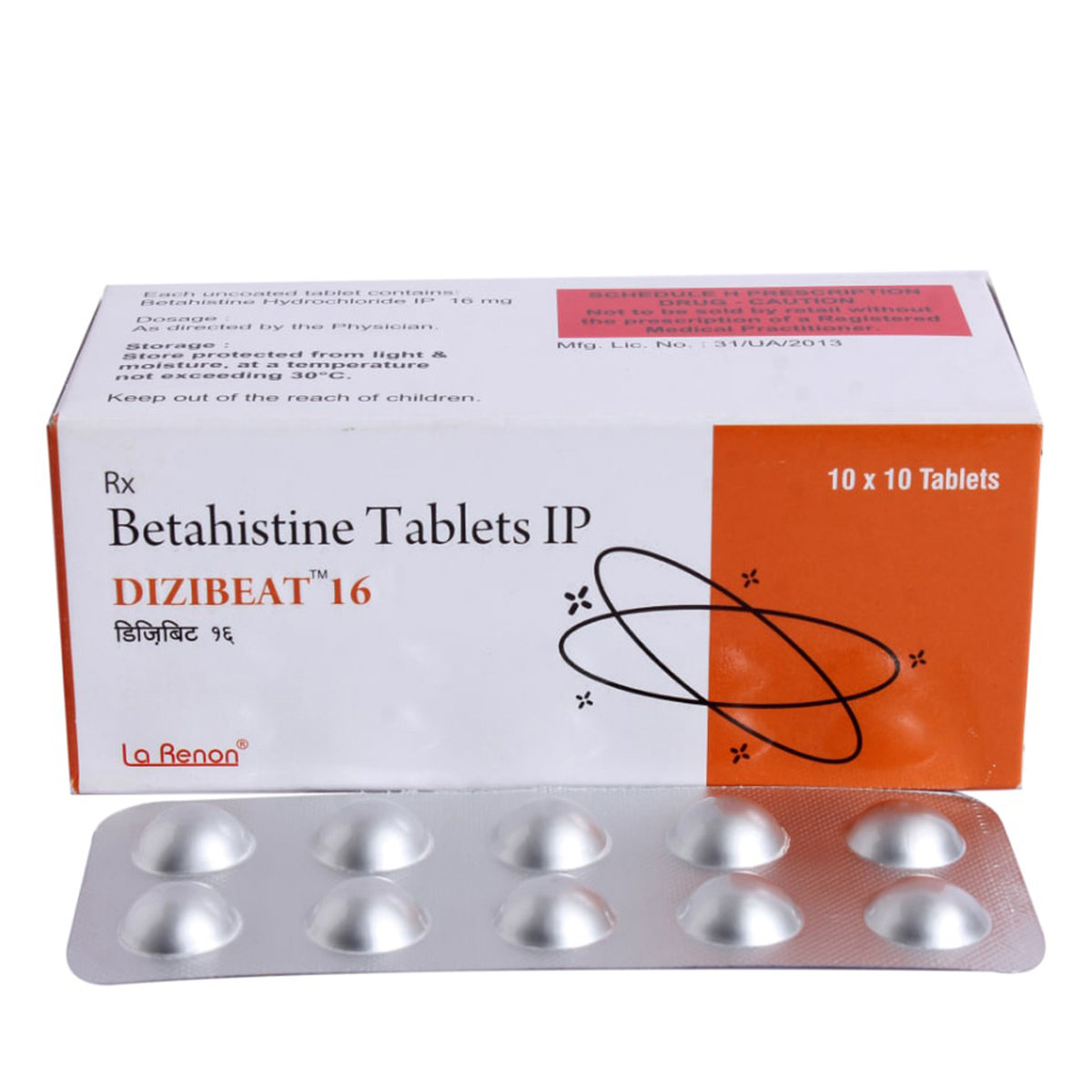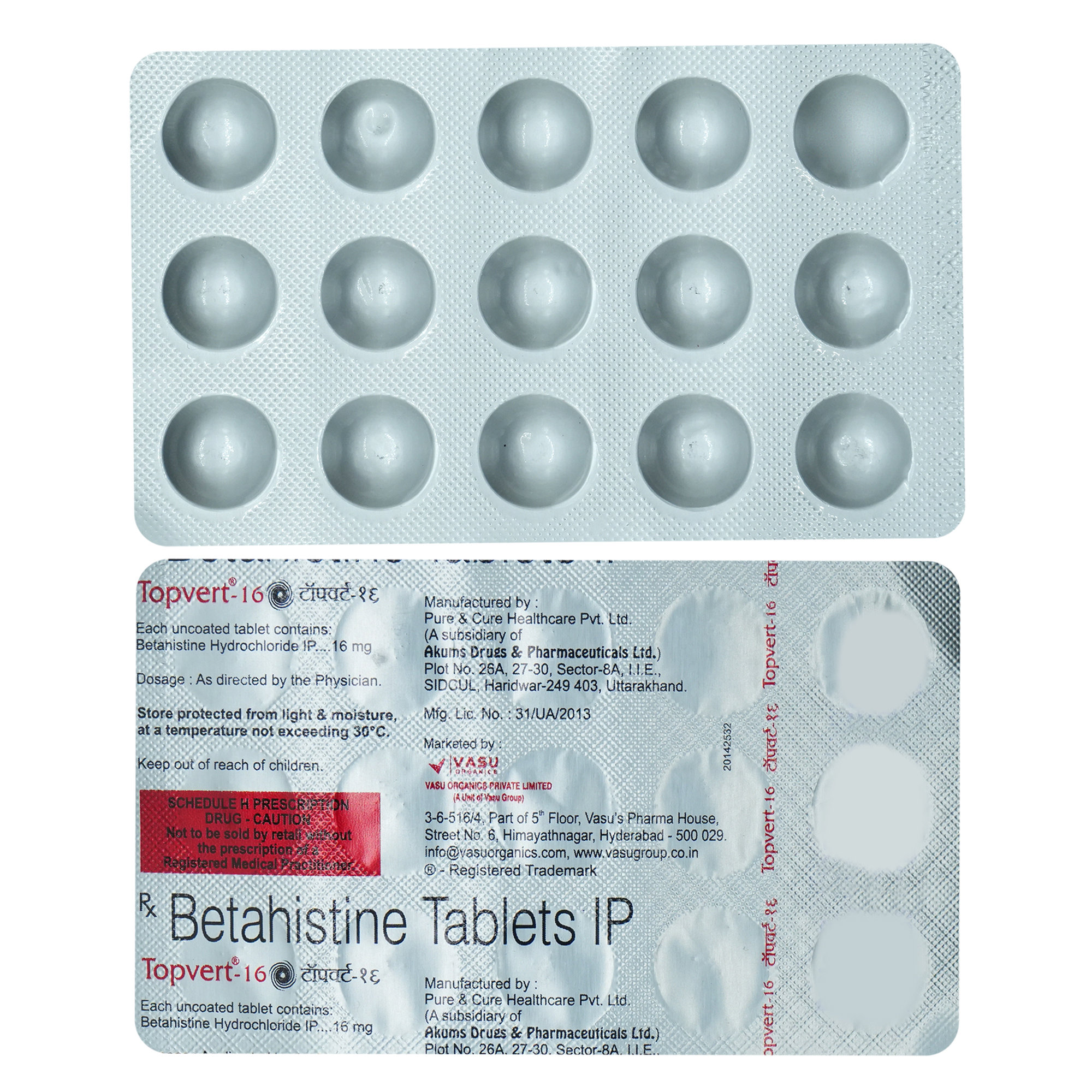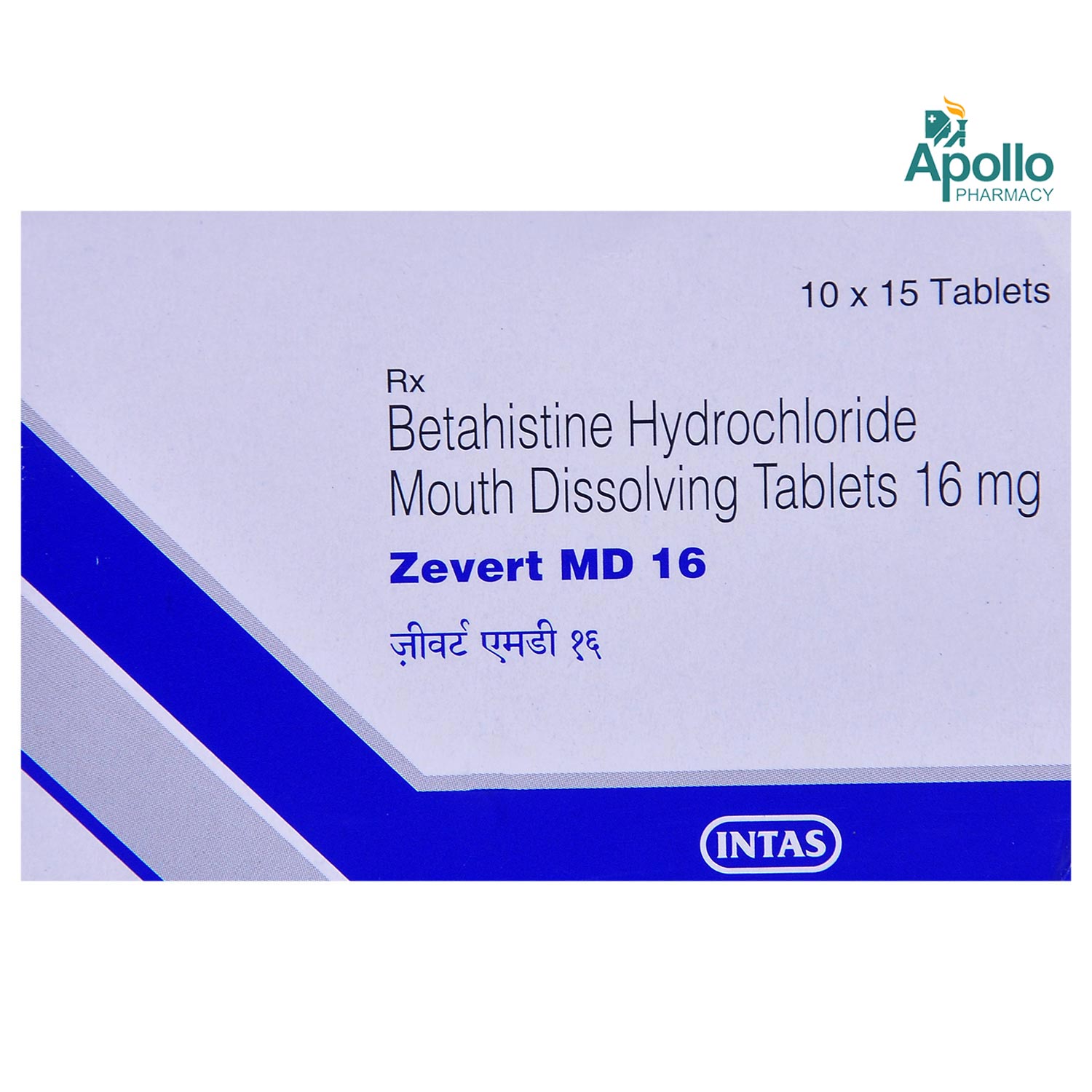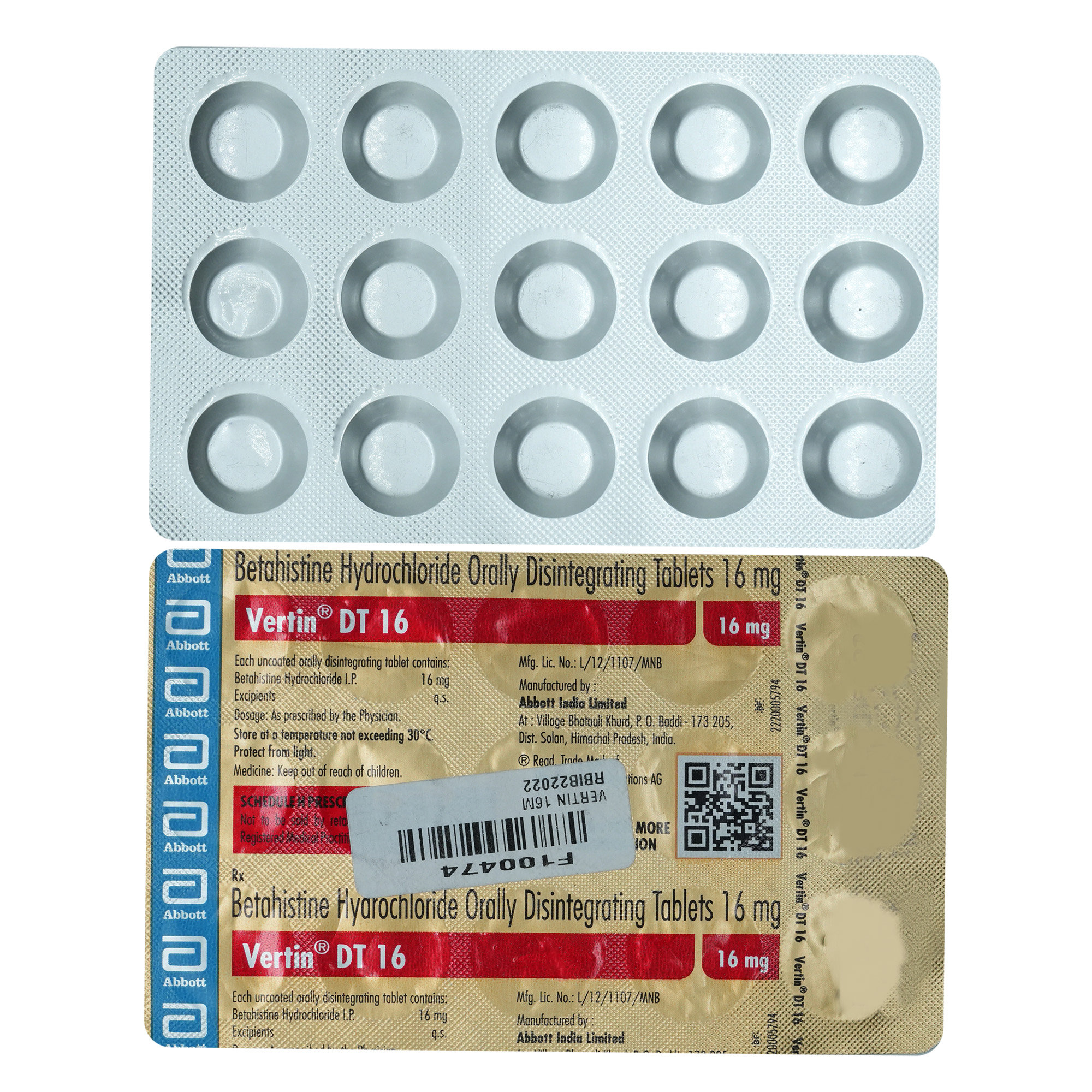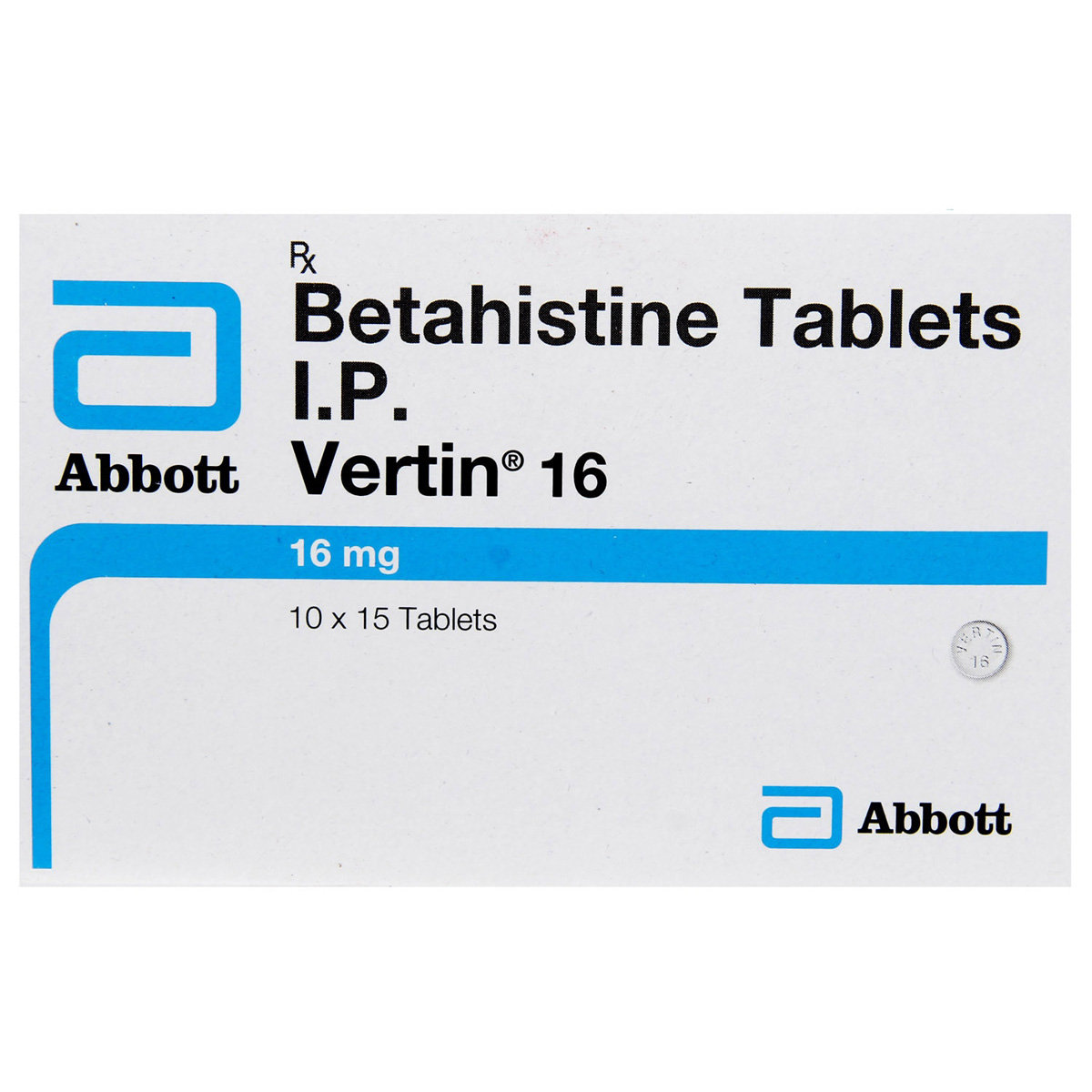Macvert-16 Tablet 10's


MRP ₹101.5
(Inclusive of all Taxes)
₹15.2 Cashback (15%)
Provide Delivery Location
Online payment accepted
 Prescription drug
Prescription drugWhats That
Composition :
Manufacturer/Marketer :
Consume Type :
Return Policy :
About Macvert-16 Tablet 10's
Macvert-16 Tablet 10's comes under the category of medications called 'antihistamine anti-vertigo medication', primarily indicated in the treatment of Meniere’s disease and its symptoms including dizziness (vertigo), ringing in the ears (tinnitus), feeling sick (nausea), and difficulty in hearing. Meniere’s disease is a medical condition that affects the inner ear caused by the building up of extra fluid inside the ear. In vertigo, a person feels that they are moving or spinning, but they are not moving. In tinnitus, a person feels a noise or ringing in their ears.
Macvert-16 Tablet 10's compromises of Betahistine that works by enhancing the blood flow to the affected part of the ear and also by reducing the amount of fluid in the inner ear. This drug also reduces the number of attacks a person can have.
Take Macvert-16 Tablet 10's as prescribed. Macvert-16 Tablet 10's may cause some of the unpleasant effects that include feeling sick (nausea), indigestion (acid reflux), bloating or mild stomach ache, headache. Most of the unpleasant effects caused by this medicine do not require medical attention and will go in a couple of days. However, if the side effects get worsen with time or do not pass in a couple of days, then one should seek medical help.
Consult with your doctor before taking Macvert-16 Tablet 10's if you have asthma, a stomach ulcer, skin rash, or low blood pressure. Macvert-16 Tablet 10's is not allowed in patients under 18 years old. A person should tell their doctor about the medicines, herbal nonherbal products they are using. If a person is pregnant or breast-feeding or planning to be pregnant, then they can only take this medicine if prescribed by the doctor. And also tell the doctor, if you have had an allergic reaction to betahistine or any other medicines in the past.
Uses of Macvert-16 Tablet 10's
Directions for Use
Medicinal Benefits
Macvert-16 Tablet 10's is indicated to treat symptoms such as ringing in your ears (tinnitus), dizziness, vertigo, loss of balance, and hearing loss associated with Meniere's disease. Macvert-16 Tablet 10's works by increasing the blood flow to your brain and by lowering the extra pressure build up in the inner ear. By easing down the symptoms associated with Meniere's disease, this drug helps a person to live their normal life.
Storage
- Inform your doctor about dry mouth symptoms. They may adjust your medication regimen or prescribe additional medications to manage symptoms.
- Drink plenty of water throughout the day to help keep your mouth moist and alleviate dry mouth symptoms.
- Chew sugar-free gum or candies to increase saliva production and keep your mouth moisturized.
- Use saliva substitutes, such as mouthwashes or sprays, only if your doctor advises them to help moisturize your mouth and alleviate dry mouth symptoms.
- Avoid consuming smoking, alcohol, spicy or acidic foods, and other irritants that may aggravate dry mouth symptoms.
- Schedule regular dental check-ups to keep track of your oral health and handle any dry mouth issues as they arise.
- Inform Your Doctor: Notify your doctor immediately about your diarrhoea symptoms. This allows them to adjust your medication or provide guidance on managing side effects.
- Stay Hydrated: Drink plenty of fluids to replace lost water and electrolytes. Choose water, clear broth, and electrolyte-rich drinks. Avoid carbonated or caffeinated beverages to effectively rehydrate your body.
- Follow a Bland Diet: Eat easy-to-digest foods to help firm up your stool and settle your stomach. Try incorporating bananas, rice, applesauce, toast, plain crackers, and boiled vegetables into your diet.
- Avoid Trigger Foods: Steer clear of foods that can worsen diarrhoea, such as spicy, fatty, or greasy foods, high-fibre foods, and dairy products (especially if you're lactose intolerant).
- Practice Good Hygiene: Maintain good hygiene to prevent the spread of infection. To stay healthy, wash your hands frequently, clean and disinfect surfaces regularly, and avoid exchanging personal belongings with others.
- Take Anti-Diarrheal Medications: If your doctor advises, anti-diarrheal medications such as loperamide might help manage diarrhoea symptoms. Always follow your doctor's directions.
- Keep track of your diarrhoea symptoms. If they don't get better or worse or are accompanied by severe stomach pain, blood, or dehydration signs (like extreme thirst or dark urine), seek medical help.
- Hydrate your body: Drink enough water to prevent dehydration and headaches.
- Calm Your Mind: Deep breathing and meditation can help you relax and relieve stress.
- Rest and Recharge: Sleep for 7-8 hours to reduce headache triggers.
- Take rest: lie down in a quiet, dark environment.
- Cold or warm compresses can help reduce tension.
- Stay Upright: Maintain good posture to keep symptoms from getting worse.
- To treat headaches naturally, try acupuncture or massage therapy.
- Over-the-counter pain relievers include acetaminophen and ibuprofen.
- Prescription Assistance: Speak with your doctor about more substantial drug alternatives.
- Severe Headaches: Seek emergency medical assistance for sudden, severe headaches.
- Frequent Headaches: If you get reoccurring headaches, consult your doctor.
- Headaches with Symptoms: Seek medical attention if your headaches include fever, disorientation, or weakness.
- Inform your doctor about the nausea and discuss possible alternatives to the medication or adjustments to the dosage.
- Divide your daily food intake into smaller, more frequent meals to reduce nausea.
- Opt for bland, easily digestible foods like crackers, toast, plain rice, bananas, and applesauce.
- Avoid certain foods that can trigger nausea, such as fatty, greasy, spicy, and smelly foods.
- Drink plenty of fluids, such as water, clear broth, or electrolyte-rich beverages like coconut water or sports drinks.
- Use ginger (tea, ale, or candies) to help relieve nausea.
- Get adequate rest and also avoid strenuous activities that can worsen nausea.
- Talk to your doctor about taking anti-nausea medication if your nausea is severe.
- Record when your nausea occurs, what triggers it, and what provides relief to help you identify patterns and manage your symptoms more effectively.
- Take medications with food (if recommended): It can help prevent stomach distress and indigestion.
- Eat smaller, more frequent meals: Divide daily food intake into smaller, more frequent meals to ease digestion.
- Avoid trigger foods: Identify and avoid foods that trigger indigestion, such as spicy, fatty, or acidic foods.
- Stay upright after eating: Sit or stand upright for at least 1-2 hours after eating to prevent stomach acid from flowing into the oesophagus.
- Avoid carbonated drinks: Avoid drinking carbonated beverages, such as soda or beer, which can worsen indigestion.
- Manage stress: To alleviate indigestion, engage in stress-reducing activities like deep breathing exercises or meditation.
- Consult a doctor if needed: If indigestion worsens or persists, consult a healthcare professional to adjust the medication regimen or explore alternative treatments.
- Get enough sleep. Maintain a regular sleep cycle.
- Eat a healthy diet and exercise regularly.
- Manage stress with yoga or meditation.
- Limit alcohol and caffeine.
- Avoid driving or operating machinery unless you are alert.
Drug Warnings
Macvert-16 Tablet 10's is not allowed to use in patients with porphyria and should be used with caution to patients with bronchial asthma. This medication is not allowed to use in children and persons who have galactose intolerance. Vertigo, tinnitus, and hearing loss are common signs of Ménière's syndrome that can harm a person's ability to drive or operate any machine. This medicine can cause mild stomach discomfort, so taking it with food can help to reduce stomach problems. Pregnant or breast-feeding females should consult with the doctor before taking this drug as the use of this medicine is only allowed in such case when benefits outweigh the risk.
Drug-Drug Interactions
Drug-Drug Interactions
Login/Sign Up
Drug-Food Interactions
Drug-Food Interactions
Login/Sign Up
Diet & Lifestyle Advise
- A person should limit the consumption of caffeine like tea, soda, coffee, energy drinks, etc., as caffeine can stimulate the nervous system and may worsen tinnitus.
- Make a habit of waiting consistently for the whole day. One should not stay without eating for 4 hours. Limit alcohol consumption as this may reduce the chances of migraines.
- Get 8 hours of sleep, which helps the body to relax completely.
A person should quit tobacco or smoking as it narrows the blood vessels and affects circulation, that may result in Ménière's disease.
Side Effects of Macvert-16 Tablet 10's
- Nausea
- Bloating
- Headache
- Vomiting
- Stomach discomfort
Habit Forming
Therapeutic Class
Product Substitutes
Drug-Diseases Interactions
Drug-Diseases Interactions
Login/Sign Up
FAQs
This medicine may take a couple of weeks to show any noticeable improvement. Even if a person starts feeling better, they still need to take this medicine and should not stop it without asking the doctor.
Although a person can consume alcohol while taking Macvert-16 Tablet 10's, but still alcohol may worsen the side effects of medicine so one should avoid taking it.
A person taking Macvert-16 Tablet 10's is allowed to take any food or drink, but still, it is better to eat a low-salt diet and avoid caffeine products that will help the medicine to work more effectively.
Yes, Macvert-16 Tablet 10's is a histamine analogue that works by improving the effect of histamine in the inner ear. At the same time, antihistamines are the drugs that work by stopping the action of histamine in the body and are prescribed for relieving the symptoms of allergy.
You will need to take beta-histamine for a long time to avoid symptoms of Ménière's disease. You will need to take a few months.
Macvert-16 Tablet 10's consists of lactose monohydrate, so a person having galactose tolerance should avoid taking this medicine. Thus, if a person is intolerant to galactose should tell their doctor so that their doctor will not advise this medicine to them.
There is no clear evidence to suggest that taking betahistine would decrease fertility in both men and women. However, if you are trying to get pregnant, talk to your doctor before taking it.
Drug-Drug Interactions Checker List
- ISOCARBOXAZID
- CETIRIZINE
- CHLORPHENIRAMINE
- SALMETEROL
- FORMOTEROL
Special Advise
It is advised to consume low sodium-containing foods as sodium may cause fluid retention and can worsen the symptoms in the inner ear.
Disease/Condition Glossary
Meniere’s disease: It is a medical condition that affects the inner part o the ear. This disease usually happens when an abnormal amount of fluid gets accumulated in the inner ear due to improper fluid drainage, abnormal immune response, viral infection, and genetic predisposition. Common signs and symptoms of this disease include vertigo, hearing loss, tinnitus, and feeling of fullness in the ear.
Hearing loss: It may start or stop by itself. If proper treatment is not provided at the right time, then it may even cause permanent hearing loss.
Vertigo: In this condition, a person experiences the false sensation of spinning or movement of objects that start and stop spontaneously. Episodes of vertigo last for 20 minutes to many hours but not more than a day.
Tinnitus: A person experience feelings of ringing, buzzing, whistling sound in the ear. People dealing with this disease often feel pressure in an affected ear.

Have a query?
Alcohol
Caution
There is no specific restriction on drinking alcohol, but some persons have reported that they have noticed a drastic improvement in their Ménière's disease after quitting alcohol.
Pregnancy
Caution
Macvert-16 Tablet 10's can be used during pregnancy but only under the supervision of a physician. Your doctor will weigh the benefits and any potential risks before prescribing it to you. Please consult your doctor.
Breast Feeding
Unsafe
Macvert-16 Tablet 10's is not allowed to take during breastfeeding or take if directed by the doctor as it is still under research that this medicine pass in breast milk or not.
Driving
Unsafe
Taking Macvert-16 Tablet 10's affects a person's ability to drive so one should avoid driving.
Liver
Caution
Macvert-16 Tablet 10's to be taken with caution, especially if you have a history of Liver diseases/conditions. The dose may have to be adjusted by your doctor.
Kidney
Caution
Macvert-16 Tablet 10's to be taken with caution, especially if you have a history of Kidney diseases/conditions. The dose may have to be adjusted by your doctor.
Children
Unsafe
The use of Macvert-16 Tablet 10's is not recommended in children and adolescents whose age is less than 18 years due to a shortage of data on safety and effectiveness.



